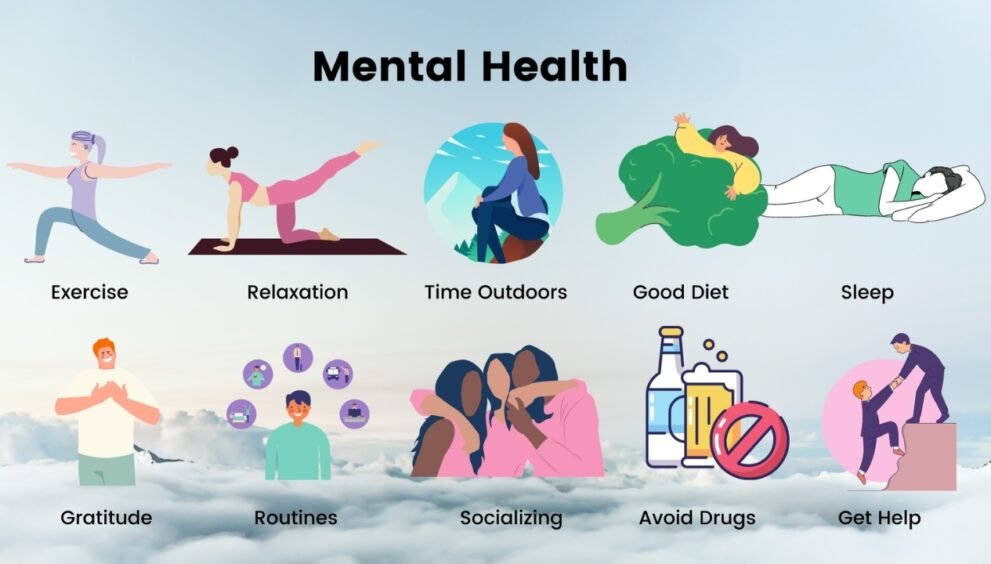Mental Health Matters:Shocking Secret Revealed!

Mental health is a fundamental component of our overall well-being, yet it often remains misunderstood or marginalized. In America, individuals face increasing levels of stress, anxiety, and depression, and grappling with mental health challenges has become ubiquitous. Fortunately, by fostering awareness, adopting practical strategies, and embracing science-backed insights, we can transform this hidden path into a journey toward resilience. From self-care routines to community engagement, this comprehensive guide illuminates how we can nurture mental health daily—because thriving isn’t just possible, it’s within reach.
Understanding Mental Health: Foundations and Importance
The term mental health refers not only to the absence of illness but also to the presence of emotional stability, cognitive clarity, and meaningful relationships. According to a scoping review, good mental health is “a state of well‑being that allows individuals to cope with the normal stresses of life and function productively.” In other words, it’s a dynamic continuum—not merely a static state—which prompts ongoing attention and care.
Moreover, the concept of Positive Mental Health (PMH) adds a nuanced layer. A study from Singapore revealed that individuals with mental disorders typically report lower levels of PMH, but that enhancing it can mediate the impact on their overall health and life satisfaction. This underscores that nurturing mental health goes beyond managing problems; it means cultivating flourishing, resilience, and meaning.
Why Focus on Mental Health Now?
In the face of rapid technological change, social isolation, and global stressors, mental well‑being has never felt more fragile. A Time article noted that despite rising access to therapy and medication, mental health conditions in America continue to worsen—especially depression and anxiety—highlighting the need for deeper, broader approaches. Thus, focusing on mental health today isn’t a luxury—it’s a necessity.
The Science Behind Mental Health
Roots in Biology, Psychology, and Environment
Modern research paints mental health as a complex tapestry of interwoven influences:
- Genetics: Certain disorders—like schizophrenia or bipolar—have hereditary components, but genes are only one piece of the puzzle.
- Environment & Stressors: Trauma, systemic inequalities, social pressures, and lack of support play significant roles.
- Neurobiology: Brain chemistry and neural circuits underpin emotional regulation. Neurotransmission is vital, yet simplistic chemical imbalance models are outdated.
Understanding these multifaceted roots means our approaches to mental health must be equally nuanced.
Innovative Research Shaping the Field
Artificial Intelligence & Mental Health
Rapid advances in machine learning are enabling early detection of mental health issues via social media patterns and clinical data analysis. These approaches promise earlier support, yet ethical safeguards are essential.
Virtual Reality Therapy
Preliminary literature reviews find that Virtual Reality interventions can help reduce stress, anxiety, and depression—but they are not standalone treatments. So, they serve as a complementary tool rather than a magic cure.
Positive Mental Health Predicts Resilience
Longitudinal studies from Germany show PMH predicts remission of anxiety and depressive disorders better than traditional diagnostic criteria. This supports expanding our focus beyond symptom reduction toward flourishing and resilience.
Everyday Strategies to Strengthen Mental Health
Exercise is more than physical—it supports cognition, boosts mood, and reduces anxiety. Evidence shows exercise stimulates neural growth and resilience. Consistent movement isn’t just physical; it’s mental reconditioning.
Quality Sleep
Sleep deprivation impairs emotion regulation. Practicing good sleep hygiene—like limiting screens before bed—promotes stability, clarity, and well-being.
Mindfulness & Meditation
Regular mindfulness practices foster emotional awareness and calm. Even short sessions can decrease rumination and strengthen mental flexibility over time.
Social Connection
Rich social ties buffer stress—research on touch interventions highlights how physical connection can enhance mental and physical health. In contrast, social media overuse may heighten loneliness and anxiety. So, create meaningful face‑to‑face moments regularly.
Cultivate a Positive Mental Health Mindset
Gratitude journaling and cognitive reframing nourish resilience by highlighting strengths, achievements, and everyday joys—even during tough times.
Foster Purpose and Meaning
Aligning daily activities with deeper values—whether volunteering, mentoring, or creative work—enriches life and bolsters mental health.
Seek Personal Growth
Engage in learning, face challenges, and cultivate new skills. Growth mindsets support personal mastery and empowerment.
Mental Health in Context: Systems and Society
Public health responses—like community-based programs, mental health education in schools, and accessible online support—have emerged as impactful strategies. They reach beyond clinics, addressing prevention and stigma.
Lived Experience & Inclusion
Research shows that involving individuals with lived mental health experiences in design and policy leads to more empathetic, sustainable systems.
Rethinking Treatment Models
While psychotherapy and medications benefit many, limitations remain—especially when social/environmental issues aren’t addressed. Solutions require holistic, situational support.
Integrating PMH in Clinical Care
Clinical models that promote PMH—through strengths-based therapy, community engagement, and life-skills work—show better outcomes.
Voices from the Experts
Dr. Carol Keyes, pioneer of positive mental health theory, writes:
“Mental illness and mental health are distinct yet correlated constructs… persons with mental disorders can at the same time experience positive emotions, form close relationships… a state of ‘flourishing.’”
Her work reminds us that building mental well-being isn’t the same as curing illness—it’s about unlocking human potential.
Digital Tools: Help or Hindrance?
While digital connections can relieve loneliness, excessive or passive scrolling often exacerbates anxiety and depression. Moderation, mindful use, and purpose-driven engagement can shift social media into a positive tool.
Role of Emerging Tech
AI, VR, and chatbots show great promise in expanding access and early detection, but ethical clarity is critical—data privacy, bias, and accountability must be managed rigorously.
Conclusion: The Ongoing Journey of Mental Health
Mental health is not a destination—it’s an adventure through resilience, connection, purpose, and growth. Whether through daily routines, community support, or emerging technology, we each hold the power to nurture our minds.
To Americans navigating modern life’s complexities: start small. Ten minutes of mindfulness, a meaningful conversation, or a gratitude note can ripple into profound change. Importantly, remember that seeking help is strength, not weakness—mental health care should be accessible, holistic, and rooted in dignity.
By embracing science, compassion, and everyday intentionality, we can transform mental health from a hidden path into a highway—guiding us toward thriving lives filled with meaning, balance, and authentic well-being.
You may also read
Effective Lower Pec Workout: Sculpt Your Chest Like Never Before








































































































































































































































































































































































































































































































